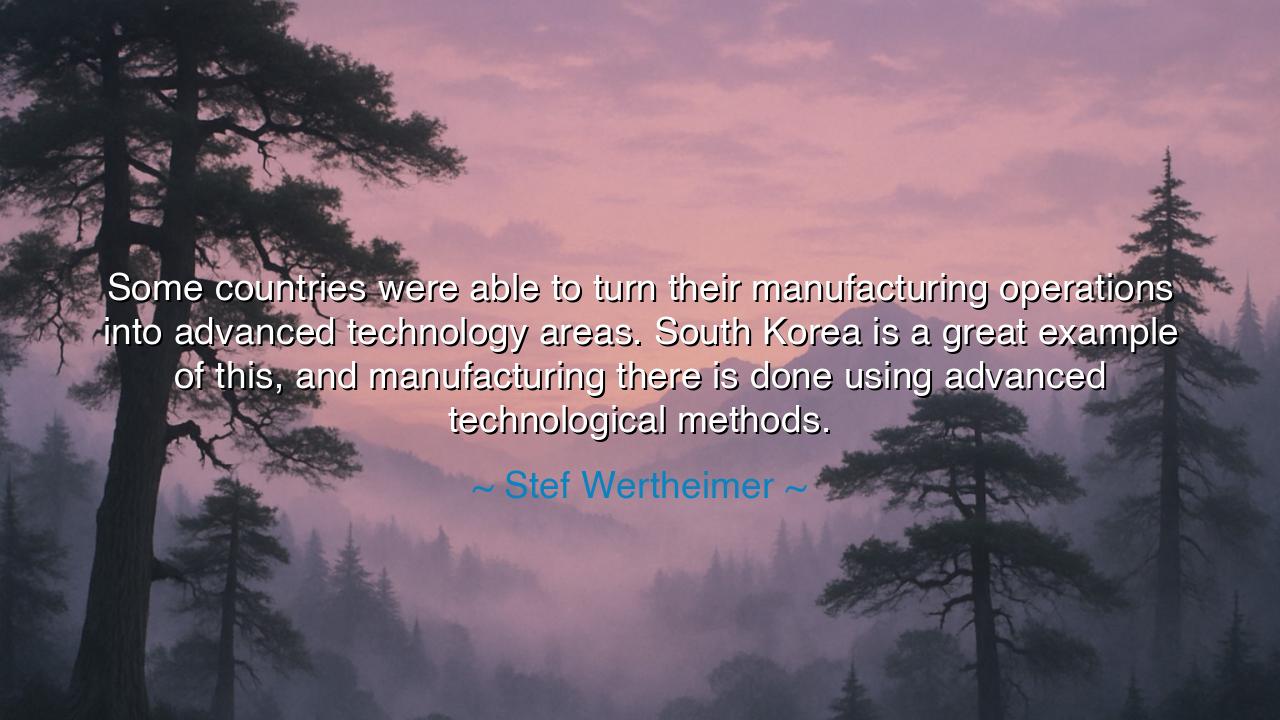
Some countries were able to turn their manufacturing operations
Some countries were able to turn their manufacturing operations into advanced technology areas. South Korea is a great example of this, and manufacturing there is done using advanced technological methods.






Stef Wertheimer, builder of industries and shaper of visions, once declared: “Some countries were able to turn their manufacturing operations into advanced technology areas. South Korea is a great example of this, and manufacturing there is done using advanced technological methods.” These words carry not only the wisdom of an industrialist but also the testimony of history. For in them lies the story of nations that rose from hardship and scarcity to become powers of innovation, guided by discipline, foresight, and the courage to embrace technology as a forge of destiny.
In ages not long past, South Korea was a land scarred by war, its fields barren, its economy broken. Many looked upon it with pity, expecting little more than survival. Yet through vision and endurance, the nation transformed its manufacturing operations from the simple to the sophisticated, from imitation to innovation. It became not merely a producer of goods, but a creator of marvels — semiconductors, ships, automobiles, and devices that carry the world’s communication in their circuits. This is the meaning of Wertheimer’s words: that through discipline and adaptation, weakness can be reshaped into strength.
History has seen this pattern before. In the days of the Meiji Restoration, Japan too rose from feudal isolation to industrial power. By embracing new technological methods while preserving its own spirit, it built ships, railroads, and weapons that transformed it into a modern nation. Likewise, South Korea, beginning in the ashes of poverty, chose the path of education, innovation, and tireless work, until it stood among the leaders of the world economy. Such stories remind us that nations, like men, are not bound by their beginnings but by the paths they choose.
Wertheimer speaks also to the deeper truth: that manufacturing is not mere labor, but a crucible where ideas meet the material world. When guided by vision, it becomes more than production; it becomes creation. South Korea did not settle for being the workshop of others; it became a laboratory of its own, turning factories into temples of progress. And through this transformation, it showed the world that even the smallest of nations can rival the giants, if only they have the will to adapt and the patience to endure.
Yet this path is not easy. It requires sacrifice, investment in education, and the courage to embrace change even when it is painful. Many nations have remained bound in old ways, clinging to outdated methods, fearful of the leap into innovation. They gained the sweat of labor but not the fruits of progress. South Korea triumphed because it was willing to forsake the comfort of the familiar, to place its future in the hands of advanced technology, and to trust that perseverance would yield abundance.
From these words, the lesson is clear: transformation is possible for all — whether for nations, companies, or individuals — if they are willing to embrace technological progress with vision and determination. The forge of destiny is open to all who step into it, but it rewards only those who endure the heat. South Korea’s example is not merely national; it is universal. It teaches us that greatness is built when we turn toil into innovation, and discipline into creation.
Therefore, let the listener act: seek not only to labor but to innovate. Whatever your field, do not be content with repetition; seek ways to improve, to advance, to master new tools. Invest in learning as the Koreans invested in schools. Embrace new methods with courage, even when they unsettle old traditions. For the story of South Korea is not just theirs — it is a beacon to all who would rise, a reminder that through technology guided by vision, one may turn weakness into strength and scarcity into abundance.






AAdministratorAdministrator
Welcome, honored guests. Please leave a comment, we will respond soon